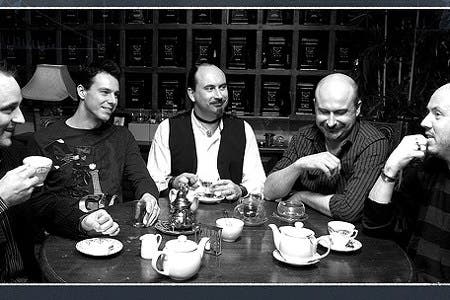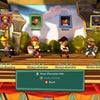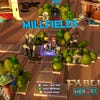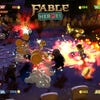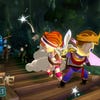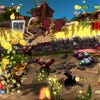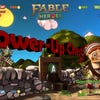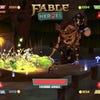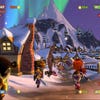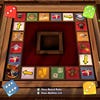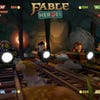Out of the Lion's Den: Why the Creators of Fable Left to Go it Alone
We talk exclusively to Another Place Productions' Dene and Simon Carter.
Peter Molyneux's departure from Microsoft and Lionhead sent shockwaves throughout the game industry. Not only had one of the most influential developers of all time ditched the company he founded in 1997, but Fable, a series guided by Molyneux's leadership over eight long years and across two generations of home console, was left without its poster boy.
Why? He left to found Guildford-based start-up 22Cans. "I felt the time was right to pursue a new independent venture," he said in a statement provided by Microsoft. He then took to Eurogamer's forum, free from the shackles of a corporate overlord, to explain further. "I just felt compelled to become an indie developer again," he wrote. And it's clear from his Twitter page that he's already enjoying coding like it's 1989.
But Molyneux wasn't the only developer to leave Lionhead recently. Earlier this month, only a couple of weeks before his departure, a new studio made up of some of the best brains behind the Fable series was announced. They're not as high-profile as Molyneux, nor as well-known, but, arguably, their influence over the Xbox RPG series was even more pronounced.
Another Place Productions is Fable franchise art director John McCormack, technical director Guillaume Portes and executive producer Jeremie Texier, all of whom recently departed the Microsoft-owned studio having played a huge part in Fable's success. These three veterans are led by Dene and Simon Carter, the founders of Big Blue Box and the original creators of Fable.
Another Place Productions aims to create "high-quality, meaningful experiences that will inspire audiences worldwide" - a deliberately vague mission statement for a five-man team operating out of Dene's upstairs living room. Here, in their first interview since the formation of the studio, the Carter brothers reveal why they left Lionhead and Fable behind to, like Molyneux, go it alone.
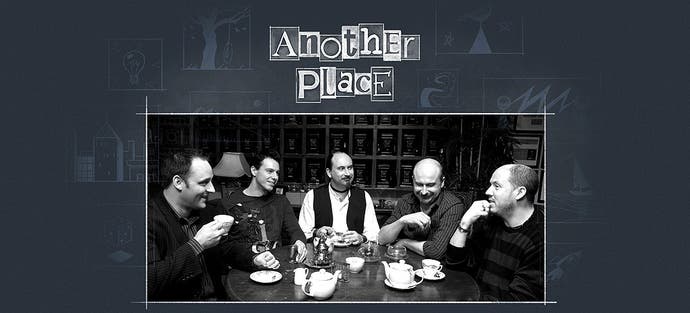
And so their story begins.
The story of the Carters' exit from Lionhead is the story of Fable's journey from ambitious RPG to blockbuster franchise. In 1998 the pair founded Big Blue Box with a single idea: Fable. But it was Molyneux's Lionhead that took the company on, absorbing it into a collective group of satellite studios to give it the support it needed to blossom - something the Carters did not expect to happen.
It started off as a completely bonkers idea nobody had 100 per cent faith in. We just hoped you weren't smoking too much crack, to use that particular phrase - Dene Carter.
"Our initial aim was to create a massive, very relevant RPG where people who didn't play RPGs would see why this form of gaming was fun, why it could appeal to them despite the fact they maybe never owned a D&D rulebook in their lives," Dene Carter explains.
"Because of the stuff Simon and myself love, John McCormack and most of the other people at Big Blue Box and Lionhead, all of the dark fairy tale stuff was a huge thing. We wanted to get across all of the worlds we loved growing up. The Tim Burton storyteller. That was our initial aim with Fable 1."
Fable 1 launched on Xbox in 2004 and wowed gamers with its reactive world and quintessentially British tone. It went on to sell two million units, success that meant the inevitable: a sequel.
"By Fable 2, it was more about, what can we throw around, what can we move, what can we shake up to make it fresh now we knew this was a successful brand, without breaking it?" Dene explains. "So we played around with the idea of getting rid of death and seeing what that did to gameplay, improving things like the sizes of the landscape, improving the social stuff in the towns, giving you more reasons to own property, all that kind of stuff."
Fable 2 launched on Xbox 360 in 2008 and sold around 3.5 million copies - another gargantuan hit. With the increased success Microsoft, its new owner, craved, Lionhead was tasked with creating Fable 3 for release in 2010.
No-one at Big Blue Box could have predicted how big Fable would become. "It started off as a completely bonkers idea nobody had 100 per cent faith in," Dene remembers. "We just hoped you weren't smoking too much crack, to use that particular phrase. Then when it was proven to be a viable series, it was more a case of making sure we didn't disappoint people. Once people start saying, 'I love it!' you think, 'Right, I've got to make another one of those and I mustn't mess it up too much.'"
That's a hell of a lot of Fable.
By Christmas 2010, Lionhead had released three major Fable games in six years, not to mention spin-off Fable: The Lost Chapters, Black & White 2 and The Movies. That's a lot of Fable - enough Fable, perhaps, for anybody, and certainly enough Fable for the Carters.
But there's more to their exit than simply fancying doing something different. As Fable grew, the Carters moved up the Lionhead career ladder, moving away from the coalface of game development and closer to management.
"1998 was when Big Blue Box started and we started working on Fable," Dene, who left Lionhead three years ago, says. "I'd worked on the Fable series for quite a long time. Because my background was coding, art, music, level design, the whole kit and caboodle, I grew increasingly frustrated that I wasn't actually doing any of those things myself any more.
"We had at one point on Fable 1 or 2, I can't remember which one it was now, a team of 120 people, all of whom I would know the names of. When I came home I would get to talk about what they did, all of them, to my wife, and then she'd say, 'Oh, well what did you do?' I'd go, 'Well, that's a really good question. Err, I think I told people to do some stuff.' That was valuable, I hear, but it didn't quite feel the same.
"So for me it was a huge drive to get back to my roots of my 8-bit coder days and have a bit more fun and actually do stuff and go, 'I did that! That was awesome! Look at that!' which is what it's all about for me really."
We had plenty of other game ideas we wanted to work on. Fable ended up dominating our life for over a decade. We wanted to get on and do some of those other ideas - Simon Carter.
Dene's brother, Simon, left Lionhead more recently, some nine months ago. "We started Big Blue Box in '98, '99. Fable took however long it took - too long (it launched six years later) - but we didn't actually expect it to be nearly as successful as it was. We had plenty of other game ideas we wanted to work on. Fable ended up dominating our life for over a decade. We wanted to get on and do some of those other ideas."
We often imagine huge development studios as the workhouse in Oliver Twist. Developers are a cog in a huge machine, bashing away at their assigned tasks until they're done. Then, it's onto the next. There is of course an element of this in all big budget game development, and that's fine for many, but when you do this on the same franchise for a number of years, it can start to get a little tedious.
Taking a break.
That's exactly how it felt for James Duncan, who worked on the Fable series for four years, helping to make Fable 2 and Fable 3 as an environment artist.
"For me personally I needed a break," he says. "As much as I loved the world of Fable, you can find yourself hating it at the end of projects because you're doing them too much.
"It's great working on million dollar games and spending three years of your life on them if the stars align; if it's a great game, if everybody gets on really well. But, that rarely happens. I've been really lucky, but for the majority it's not like that. You're in a team of a hundred people. Unless you're taking executive level decisions, you're pretty much given stuff to create. If you're an artist, you're just banging stuff out, effectively. It's hard to keep your passion in that case."
Passion is important, here. We hear it often from developers who have left triple-A behind to create smaller games. Passion, it seems, is easy to lose when you're another brick in the wall. But it can be reignited, if the wall you make is your own.
Duncan, currently working on a space combat trading game called Rogue Star, began his game industry career at Probe Entertainment, working on 1996 Psone game Die Hard Trilogy for Sony. Getting back to the experience he had making that game, getting back to the passion that fuelled its creation, helped motivate him to ditch Fable development for the WildWest that is the AppStore.
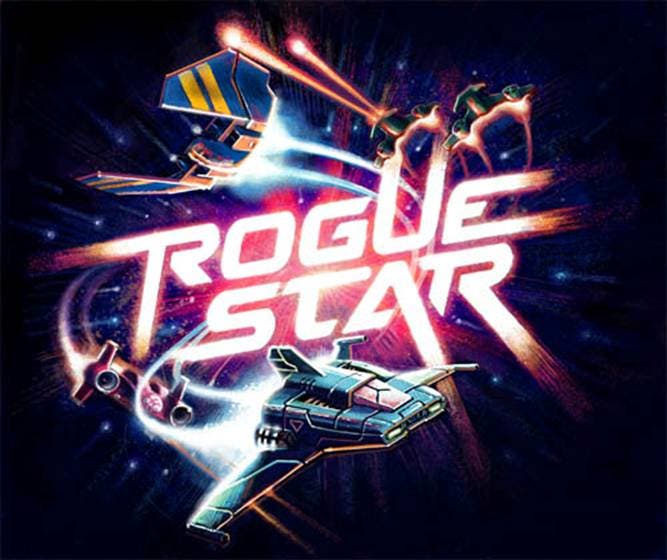
"Back in the day, something like Die Hard Trilogy, you're talking about a small team of 10, 15 people tops," he says. "We'd have an idea and we'd go, right, well, plonk it in. Have an idea at nine in the morning and by 11 it was in. But those days are gone now.
"So a lot of people from that era, people are thinking, with iOS, you know what? I've done the big game thing and giving over years of my life to something. Now there's this outlet where we can all of a sudden do what we want and get that passion back."
The thought occurs: is there no room within Lionhead to create something different, something off the wall, something, that isn't Fable? "Bluntly, I never asked," Dene says. "I'm sure if we'd asked Microsoft, 'Hi, we want to do something completely wacky and outside the realms of Fable,' they probably would have done something. But at the time I just wanted to sit here in my flat by myself for as long as I needed to, to write something all by myself, and I didn't really think anybody else should be paying for that but me."
And, as Simon points out, there is evidence to suggest there is room within Lionhead for experimentation. Fable Heroes, an Xbox Live Arcade spin-off beat 'em up inspired by Castle Crashers, emerged after a small team of Lionhead developers tried something different, pitched it to the powers that be, then got the coveted thumbs up. "Fable Heroes is a surprise," Martin wrote in his preview, "and an utterly charming one at that."
But with the formation of Another Place Productions, made up of five key former Lionhead developers, and Molyneux's exit, all in the last month, you'd be forgiven for thinking there was something a little wrong at Lionhead. It's hardly an exodus, but it's obvious that people are leaving to do their own thing - important people, too.
According to the former staff we spoke to, there is no great drama here. There is no great argument, no great disgust at what Fable has become, or where it is going. There are spin-offs, such as Fable Heroes and Kinect exclusive Fable: The Journey - a game Molyneux continues to work on as a consultant - but there is plenty of room for them within the franchise, former staff say. As Dene puts it: "There's absolutely nothing wrong with Fable."
"When we started there was no such thing as the long franchise, really," he continues. "Dungeon Keeper got a second game and that was amazing. And Magic Carpet got a second game and we though wow, that's amazing! And that was as far as things went, ever. We didn't think this was going to become a huge property and an enormous franchise like Castlevania or Mario. I think for Microsoft it still is to some degree. That's great and we love it. But at the same time, I wanted to do stuff myself and I think Simon wanted to work on something different."
I made this.
For many developers, leaving a huge studio is only as difficult as the bonds they have with co-workers are strong. But for the Carters this feeling was magnified. Not only did they leave friends behind, but their children too - the Fable games.
In the early days of Fable, it was much easier to have a large impact. Once it's an established franchise, once most of the unknowns have gone, there are only so many ways it can go wrong - Dene Carter.
"There was an emotional wrench in terms of leaving that project behind," Simon admits. "But there was no doubt that the people who are there would make something absolutely awesome next, which made things an awful lot easier from our point of view."
"When you have 120 people plus who you're working with on making a game and you know they're all absolutely fantastic and you absolutely dearly love them - and, frankly, you have to because you get an awful lot of shared body odour in a company like that during crunch months - when you have that kind of relationship, when you do walk away from something like that, you do feel a sense of betrayal, like you're wandering off and leaving something," Dene says.
"But you never think, it's going to get worse from now on, or my brand is going to be somehow diminished. No, you worked with 120 people, all of whom were awesome. One person has left. That may be an important person, but the rest of the people left behind know what you would do under those circumstances. The game has enough impetus in itself. People know what's Fable-ey and what's not.
"In the early days of Fable, it was much easier to have a large impact. Once it's an established franchise, once most of the unknowns have gone, there are only so many ways it can go wrong. As it goes on there are fewer and fewer reasons why something might do badly. So you become increasingly confident that everything will be fantastic once you've left anyway."
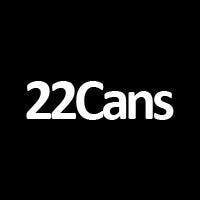
In the wake of the formation of Another Place Productions and 22Cans, we asked Microsoft for an update on the Guildford-based developer, which has two games due out this year and another, possibly Fable 4, due out in the future. Here's its response, in full:
"Naturally we're sorry to see talented people leaving Lionhead. However we understand that sometimes people want to move on to new challenges. We want to acknowledge and thank them for their contribution to Lionhead's success over the years and wish them all the very best for the future.
"But as a company of some 150 people we are lucky to have some of the best development talent in the world and are confident that we will continue to release exciting and innovative games. All current Lionhead projects, including the development of Fable the Journey, remain on track and we're excited to share more details in the coming months."
